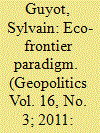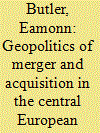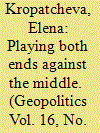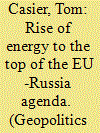|
|
|
Sort Order |
|
|
|
Items / Page
|
|
|
|
|
|
|
| Srl | Item |
| 1 |
ID:
106746


|
|
|
|
|
| Publication |
2011.
|
| Summary/Abstract |
There is a gap in the geographical/geopolitical literature about the process that motivates humans to conquer a boundless, timeless and invaluable wilderness in the name of plural ecologies to serve their own political interests in control and territory building by means of 'green gerrymandering'. The ecological frontier (or eco-frontier), a neologism produced by a contemporary greened civil society, can be considered a new paradigm that embraces the mental representations and spatial constructions of eco-conquest without restricting its temporal dimension to the present time. Indeed, the eco-frontier is a genealogical paradigm where new dynamics always revisit old processes. The creation and use of the eco-frontier can illuminate the history of the global territorialisation of nature in the last three centuries. From a spatial point of view, two main understandings of the eco-frontier exist. The first characterises virtual and mental imageries of natural spaces of eco-conquest that are strongly associated with Westernised representations of nature. The second considers eco-frontiers as geographical processes to understand the green dynamics of territorial appropriation and re-conquest. As a genealogical paradigm, the eco-frontier has a specific temporal dynamic that integrates the different historical contexts and political ideologies of nature. Three generations of eco-frontiers (Empire, Geopolitical and Global generations) began at different times and co-exist today, with superposition and percolation. This empirical study shows how contemporary environmentalists and green stakeholders produce specific discourses and representations on global eco-frontiers. The paper focuses on the current territorial domination carried out by contemporary eco-conquerors creating possible new geopolitics.
|
|
|
|
|
|
|
|
|
|
|
|
|
|
|
|
| 2 |
ID:
106742


|
|
|
|
|
| Publication |
2011.
|
| Summary/Abstract |
European Union (EU) member states' 'failure' to cooperate on energy policy towards Russia has been much criticised in the media and by policy analysts since the mid-2000s. This article analyses member states' choices to ensure domestic supply security by either increasing gas supplies from Russia or by reducing gas imports from Russia. The article seeks to explain why the member states pursue energy supply objectives towards Russia that are opposed by other member countries, despite the official commitment to acting 'in a spirit of solidarity'. It argues that the member states' choices are informed by their assessment of the geopolitical reality and its expected impact on their national energy supply security. This is, in turn, informed by their perceived vulnerability that stems from their geographic location, historical experience and bargaining position vis-à-vis Russia. The analysis shows that calls in the EU for 'solidarity' regarding the security of natural gas supply serve primarily as a cover for the pursuit of individual and not collective EU interests. The rhetoric of 'solidarity' and the need for cooperation in the EU also serves the European Commission's interest in acquiring a more important role in external energy policy.
|
|
|
|
|
|
|
|
|
|
|
|
|
|
|
|
| 3 |
ID:
106739


|
|
|
|
|
| Publication |
2011.
|
| Summary/Abstract |
The article examines the EU's and specifically the European Commission's proposals for an external energy policy. The analysis departs from the assumption that the geographical scope of the Commission's proposals is not the result of 'geopolitical facts' but rather of a discursive policy process of geopolitical writing in which geopolitical images and ideas are constantly being created and re-created. I first examine how the Commission is constructing its vision of an integrated European energy space in theory and how it uses 'spectacular' images to justify the linkages between energy security and geography. I then distinguish between Walters's notions of 'networked' and 'colonial' type of relations between the EU and third states to examine the wider political purpose behind the Commission's vision of the European energy space. I then analyse the extent to which the Commission's geopolitical vision has been or can be implemented in practice in four concrete empirical case studies: EU energy relations with Eastern Europe, the Mediterranean/Middle East, the Caucasus and the Russian Federation.
|
|
|
|
|
|
|
|
|
|
|
|
|
|
|
|
| 4 |
ID:
106747


|
|
|
|
|
| Publication |
2011.
|
| Summary/Abstract |
Are we witnesses to the resurrection of geopolitics in Germany? At first sight the recent emergence of a 'new Cold War' narrative on Russian energy appears as part of a wider renaissance of geopolitics. Yet, a closer look will reveal the presence of a stealthy quasi-liberal geopolitics, equally laden with spatial language that preceded the new Cold War. This article tries to unpack this earlier narrative of 'strategic partnership' that has remained popular within the German energy policy establishment. Here we encounter a story of cooperation between two former geopolitical rivals that are situated within a Europe that seeks to modernise a yet backward but adaptive East. Hence, what we could observe is not the death and rebirth of geopolitics, but merely a partial narrative transformation from one type of geopolitics to another. The article suggests that geopolitics could not have been dead, for it has always been undead.
|
|
|
|
|
|
|
|
|
|
|
|
|
|
|
|
| 5 |
ID:
106737


|
|
|
| 6 |
ID:
106744


|
|
|
|
|
| Publication |
2011.
|
| Summary/Abstract |
In September 2007 the Austrian oil and gas company, OMV, issued a declaration of intent to merge with its Hungarian competitor, MOL. The merger was regarded by MOL as a hostile takeover bid and it initiated a series of measures designed to defend its independence and position within the Central European energy market. These measures, while intended to shore up MOL's defences in the face of an increased threat of merger and acquisition from larger companies aided by the demands of the EU to liberalise the energy market, reflect the rising instance of economic nationalism within the EU and have specific implications for the promotion of solidarity at an EU level. At the same time they also reflect the increased securitisation of energy. This is important when you consider that the actions of multiple players in the battle for MOL, including Russia through involvement of Surgutneftegaz following its purchase of a series of MOL shares in March 2009, has effectively created an energy security dilemma, whereby the actions of one actor to increase its own security leads to retaliatory actions by a second actor threatened by the actions of the first. Within the Central European energy market this is happening on multiple levels and impacts the relations between EU member states, the EU and Russia. The article uses the MOL case to highlight how the geopolitics of merger and acquisition in the Central European energy market means it effectively operates in a state of persistent insecurity.
|
|
|
|
|
|
|
|
|
|
|
|
|
|
|
|
| 7 |
ID:
106745


|
|
|
|
|
| Publication |
2011.
|
| Summary/Abstract |
This article brings together governmentality and political economic readings of security to offer a critical examination of the international HIV/AIDS programmes operated by the US Department of Defense, particularly as they focus on populations in Africa. Reaching groups often left out of national HIV/AIDS strategies and conducting research into HIV vaccines, US military HIV/AIDS programmes can be read as supportive of the broader global health effort to secure populations from HIV. However, a consideration of publicly available material shows that growing US commitment to addressing the problem of HIV/AIDS parallels, and in the case of military programmes intersects with, the idea of Africa as a locus of strategic resources, fragile states and potential terrorist threats. These ideas are furthermore articulated in terms of a neoliberal teleology, in which health programmes appear as part of an effort to help populations along the path to normal, healthy development, occluding the exploitative manner in which populations and regions highly affected by HIV have been incorporated into the global political economy. Such rationalities are problematic in that they obviate a more substantive grounding of health in ideas of peace or equity and thus provide a poor guide to a more healthy global order. While noting the contribution of US military programmes to the international response to HIV/AIDS, the article emphasises the importance of examining associations between HIV/AIDS, military forces and security in terms of the broader web of rationalities and relationships within which they are situated.
|
|
|
|
|
|
|
|
|
|
|
|
|
|
|
|
| 8 |
ID:
106741


|
|
|
|
|
| Publication |
2011.
|
| Summary/Abstract |
Ukraine plays an important role as a transit country for the delivery of Russian energy to the EU. This study focuses on Russia's policy towards Ukraine in the energy sphere, presenting it against the background of complex geopolitical energy games, which are taking place among the three actors. Even though these actors share common interests and challenges, the geopolitical games complicate and undermine the relationships. There are no true winners. Instead of integration and opportunities, the pursuit of geopolitical benefits creates mistrust, exclusion and vulnerabilities.
|
|
|
|
|
|
|
|
|
|
|
|
|
|
|
|
| 9 |
ID:
106743


|
|
|
|
|
| Publication |
2011.
|
| Summary/Abstract |
This article draws on concepts from public policy analysis and the literature on EU member state influence to examine Poland's efforts to project its preferences onto European external energy policy. It argues that Poland's attempts to 'upload' its preferences are motivated by a perceived 'misfit' between European external energy policy and Warsaw's broader geopolitical priorities concerning Russia. The main aim of the article is to assess the impact of Poland's entrepreneurial efforts on the EU level and to review the relevance of several factors contributing to their success or failure. For this purpose, the article provides an in-depth, empirically rich case study focusing on Warsaw's call for 'energy solidarity' in the context of its 'Energy NATO' initiative in 2006 and the reform treaty negotiations in 2007. It concludes that Warsaw's 'uploading' efforts have faced very considerable constraints, but nevertheless succeeded at placing the notion of 'energy solidarity' onto the EU agenda.
|
|
|
|
|
|
|
|
|
|
|
|
|
|
|
|
| 10 |
ID:
106738


|
|
|
|
|
| Publication |
2011.
|
| Summary/Abstract |
Recent discussions on the development of European Union (EU) energy policy have become dominated by a discourse of insecurity relating to the questions of energy dependence and relations with energy suppliers, echoing the debate during the energy crises of the 1970s. This article compares the two periods, analysing the way in which the EU (and the European Community in the 1970s) reacted to disruptions to energy supply. The article critically applies the concept of securitization, arguing that while the salience of energy increased in both periods, the Europeans neither faced an "existential threat" nor adopted "extraordinary measures" in responding to the crises.
|
|
|
|
|
|
|
|
|
|
|
|
|
|
|
|
| 11 |
ID:
106740


|
|
|
|
|
| Publication |
2011.
|
| Summary/Abstract |
Over the last decade we have witnessed an increasing politicisation of the energy discourse. Today energy relations of the EU are framed in terms of excessive dependence on Russia, qualifying the latter as a security threat. This article puts forward four criteria to define energy relations in security terms: supply vulnerability of the EU, the absence of Russian demand dependence, the dominance of energy over other capabilities, the willingness to link energy to foreign policy objectives. Little support is found to define the dependence on the import of Russian energy resources as a security issue. An alternative explanation is given, attributing growing energy concerns to shifting identities and perceptions in EU-Russia relations, which have contributed to understanding energy relations in competitive and geopolitical terms. Russia has developed a more assertive energy diplomacy, while in the EU sensitivity over energy dependence has grown as a result of changes on the global energy market and of the 2004 enlargement.
|
|
|
|
|
|
|
|
|
|
|
|
|
|
|
|
|
|
|
|
|